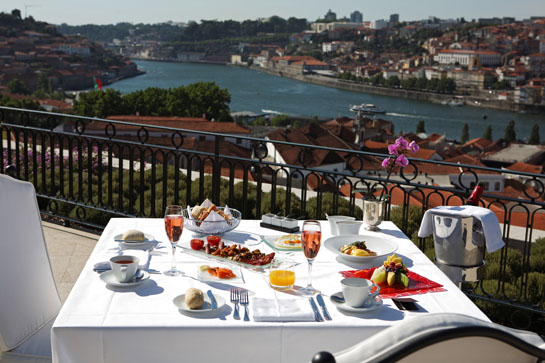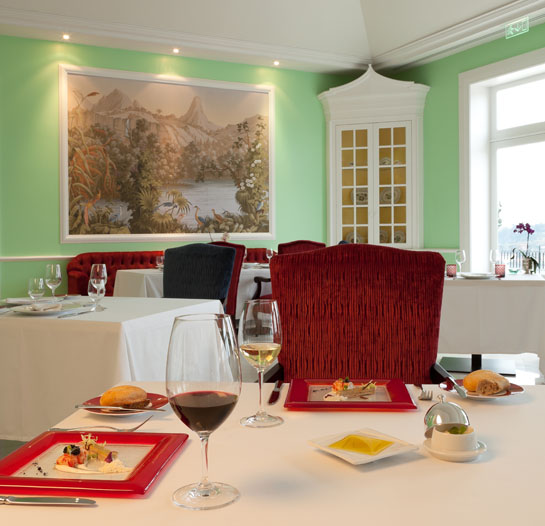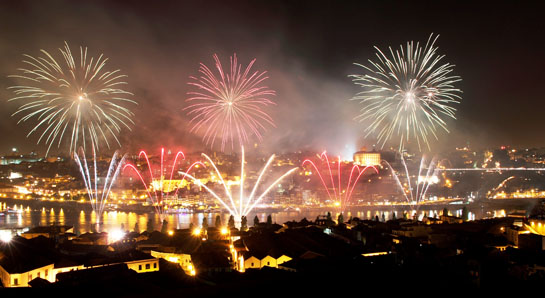The São João Festival:
Portugal’s
Largest Street Party
Richard L. Elia

If you’re interested in seeing Europe’s biggest street party, come to Oporto. And if you’re interested in local color, or spirit of place, or extraordinary native expression, then be there June 23 for the São João (“soun- joun”), the annual festival to Saint John, a “moveable feast” that would have impressed Hemingway.
The São João festival is more than 600 years old, and is often considered Europe’s oldest party. In its earliest creation, it was originally a pagan experience honoring both fertility and the sun god, but the Catholic Church later assimilated and sanitized it, making it a holiday in honor of Saint John the Baptist. At São João both the profane and sacred experiences happily
co-exist.
On June 23, Old Oporto is at play. New Orleans’ Mardi Gras bears a distant relation to it. The costumes are not extravagant here—just gay colors and well attired Portuguese in holiday dress—but the excitement, feasting, merriment, and Dionysian hilarity are there, as an estimated 200,000 people crowd the narrow streets of Oporto’s Old Town. Street concerts abound, bars and restaurants overflow, barbeques are on every corner, bonfires enhance the scenic evening skies. There’s nothing not to like. In the early morning hours, people are still partying but some gradually saunter to the Foz (the old riverside area of the town) waiting for the sunrise, a post-pagan expression that is touching in its solemnity and serving as a dramatic contrast to the night’s gaiety.

São João is special to Oporto, so tourists and travelers respectfully remain on-lookers, usually from restaurants, bars, and hotel terraces. Our experience was from The Yeatman, the best hotel in the region and one of the finest in Europe. This 5-star property opened in 2010, and within months made the “Best” list of virtually every major style and culinary publication. The Yeatman is related to Taylor, Fladgate & Yeatman, the oldest and finest of Port shippers, located in the historic lodge area of Vila Nova de Gaia, Porto. For us, it was more than a hotel: it was an experience, with an elegance that never needed to announce its opulence; it had grace not gauche. It has what all the fine hotels have: spa, pool, gym, gardens, panoramic views, wellbeing center . . . . The Yeatman calls itself a Luxury Wine Spa Hotel, and it is this, and more. What differentiates The Yeatman from much of the European competition is the unaffected charm, the genuine warmth of its staff and their invisible presence.
The Yeatman dining room is an example of the invisible presence. Service is understated with an unpretentious dignity. Service is chameleon-like: present but unseen. It’s a one star Michelin property. Anyone familiar with Michelin stars knows that most of the best restaurants in Europe have one star. Beyond that you’re no longer dealing with fine cuisine: you’re also into interior design, overstated elegance and spectacle. The Yeatman restaurant is quiet; we admire that. For the last fifteen years, Quarterly Review of Wines has been an enemy of restaurant noise, something which restaurants are only now becoming alert. Decibels ratings for most U.S. restaurants range in the oppressive area of 90 decibels (50 to 60 is considered appropriate). Diners can concentrate on food, wine, and conversation, the very things they paid for. The Yeatman encourages this. It’s not monastic, it’s respectfully alive. Tables are also generously spaced. The dining area offers a gorgeous view of both the River Douro and the city proper. Chef Costa oversees the dining. The cuisine, as expected, centers upon a diversity of fish presented in contemporary Portuguese fare, which never loses its ethnic identity. Fresh produce abounds. Wines—some of which few mortals have ever heard of—represent the best of Portugal. Last count there were 1200 wines, with a staggering Port collection.

At midnight, a spectacular 20 minute São João festival fireworks display lights up the Oporto sky, and the Douro River seems almost aflame. Next day, watch the annual rowing regatta and the impressive Barcos Rabelos (low wooden boats that once transported Port from the Douro Valley). Most of the best known Port houses have their own boats. Guests at the hotel can board The Yeatman Barcos Rabelos and follow the regatta rowers to the finish line at Ponte Dom Luis Bridge.
A three-day stay for the June 22 to 24 festivities in a superior room, with double occupancy and all the trimmings is under $500.
The hotel has 12 suites and 70 rooms, and it’s children friendly. And the Douro valley’s Port “lodges” and the impressive mountain views are only ninety minutes away. It’s the vacation you deserve—this and a toast (Saúde) with the incomparable and costly 1963 Quinta do Noval Nacional Port.
